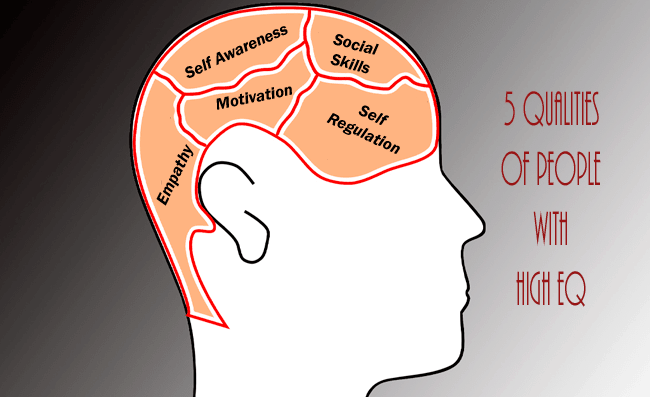Emotional Intelligence (EI) or Emotional Quotient (EQ) began as dark horse. However, it is fast emerging as a prime factor that can rule your entire life- personal, professional, social and financial.
In fact, EQ testing is expected to become an essential tool in testing if you possess proper mental skills for a job.
What is Emotional Intelligence or EQ?
Simply put, Emotional Quotient is: “The potential to feel, use, communicate, recognize, remember, describe, identify, learn from, manage, understand and explain emotions.”
You can find extensive research about EQ on website the US government’s National Library of Medicine. Further, Psychology Today website describes EQ in a slightly different way: “Emotional intelligence is the ability to identify and manage your own emotions and the emotions of others”.
It is generally said to include three skills: emotional awareness; the ability to harness emotions and apply them to tasks like thinking and problem solving; and the ability to manage emotions, which includes regulating your own emotions and cheering up or calming down other people.”
Are you emotionally intelligent?
Before jumping to conclusions about our own abilities, we need to understand three vital facts.
- Emotional Quotient (EQ), in most people, is inborn trait.
- You can acquire some degree of EQ skills if you are willing to exert extra efforts.
- Pretending you have EQ can land you in serious emotional problems that may require psychiatric help later.
Practical uses of Emotional Intelligence
Eminent psychologist Daniel Goleman is one of the main proponents of Emotional Intelligence and a pioneer of sorts in this fairly new stream of psychology. He says, Emotional Intelligence serves five main purposes.
These are self-awareness, self-regulation, motivation, empathy and social skills. Proper blend of these emotional skills are vital for all areas of life.
Especially, jobs where you need to deal with other people. Therefore, let us examine these five qualities of people with high Emotional Intelligence.
1. Self Awareness: The main trait of EQ
It means having a complete understanding of your present moment. Additionally, such understanding should have proper, down-to-earth realistic basis.
Further, it should be away from own fantasies or grandiose views about yourself. Self awareness also means, you know every single emotion going on in your mind at any particular moment.
However, most of us deceive ourselves by falsely believing we have control over our emotions. Beware, because this can land you in serious emotional trouble when facing adverse situations.
People with high EQ know how to tackle jealousy and anger. Moreover, they think well before doing something. These people are thoughtful of others. Despite, they are able to say no.
They have a high degree of personal integrity and are not disturbed by any change such as new job or home.
2. Self regulation: The vital art of control
You can consider this the most important trait of Emotional Quotient.
Simply put, self regulation means having a complete control over the emotions you feel at any given time, place and situation. However, this does not in any way mean you should pretend to have control over your emotions.
In fact, it simply means you should be able to identify every positive and negative emotion and assess why you feel that way. Furthermore, it means you should know how to control them.
For example, you can hide intense anger or show it. However, Emotional Intelligence means, putting your anger to proper and beneficial use.
3. Motivation: A key leadership skill
“People often say motivation does not last. Neither does bathing. That is why we recommend it daily.”- Zig Ziglar, American author and motivational speaker.
Studies about leadership skills reveal that people with good EQ are usually self-motivated. Meaning, they do not require motivation from external sources and factors. Usually, they will find some very good reason that motivates them to do their work.
Further, good leaders also know how to motivate others in a team or family. They are aware of their own emotions as well as those of others around them.
Daniel Goleman has written an excellent paper titled ‘What Makes a Leader’ for Harvard Business Review, providing great insights into EQ.
4. Empathy: Not to be mistaken for kindness
All of us are kind with people lesser fortunate than us. However, empathy assumes a different meaning for Emotional Quotient or EQ.
Simply put, it means understanding how a particular person or a group of people are feeling at the moment. Further, it means taking into consideration their respective circumstances.
You are correctly able to judge the needs and wants as well as views of one or more persons, even if the other does not show them openly.
Empathetic people have excellent skills at managing relationships at home, society and work. Moreover, they do not form an opinion about a person immediately. Instead, they wait and understand feelings of others.
5. Social Skills: To ensure your survival
Everyone needs social skills for basic survival. In any case, humans are social animals and we cannot live alone, outside a society. You will surely have seen some people find it easier to get along with others.
Presumably, these people have excellent Emotional Intelligence. They use these social skills to form, develop and maintain relationships.
In addition, they focus on overall benefit rather than being selfish. You will definitely find such people putting common good first, without much personal consideration.
Their social skill ensures success wherever they are- family, society and work.
Learning more about Emotional Quotient
Currently, Emotional Quotient / Intelligence is a very hot topic. You will find countless resources to learn about EQ and its different uses.
These include books written by various prominent researchers in the field. Further, you can also take a variety of videos on YouTube to know how you rank for your Emotional Intelligence.
Easy reading material, online tests, lectures and resources for developing your EQ are available free online.
Testing your Emotional Intelligence
Before rushing to download information or buying books on EQ, let us know where we stand. A wide range of free and paid online tests for Emotional Intelligence are available.
However, do not consider these as final results. Some of these free online tests are designed for specific nationalities, races or cultures. Therefore, finding the right free online test for yourself can be difficult.
Moreover, online tests ask only a few questions to gauge your EQ. Very often, these are inadequate to give you correct indication of your EQ Test.
However, this is not a reason to be discouraged. You will definitely find EQ testing centres near your residence. Though they will charge a nominal fee, their results are likely more precise.
Merely because the test questions will be made keeping in mind your nationality, culture and other vital factors. Approaching a new employer with your EQ results can definitely boost your job prospects in some situations.
High Intelligence v/s Emotional Intelligence
A few decades before, Intelligence Quotient- commonly called IQ- was developed. Nowadays too, IQ tests are given to students and graduates. The common perception is that people with high IQ fare better at studies and work.
However, extensive research shows this to be untrue. A large number of people with great IQ levels live miserable personal and social life. The reason is simple- these people do not possess good Emotional Intelligence.
Essentially, they cannot achieve their full potential in life as friend, parent, employee and member of society. Emotional Quotient (EQ) testing helps solve this handicap of IQ tests.
Jobs that require high Emotional Intelligence
Employers welcome job seekers who exhibit high levels of Emotional Intelligence. Therefore, as significance of EI rises, some jobs are especially for those who have great Emotional Intelligence.
- Armed Forces
- Surgeons and doctors
- Nurses and caregivers
- Emergency Medical Services staff and paramedics
- Police
- Front-line journalists for print, digital and TV media
- Advertising experts
- Community leaders
- Lawyers
- Military engineers
- Charity and relief workers
- Diplomats
- Teachers
- Customer Service staff
- Fashion designers and other fine arts jobs
Developing your own EQ
As we mention before, developing your personal Emotional Intelligence can be quite a task. Therefore, taking an EQ test before embarking on any such venture is a wise move.
Once you know areas where you lag in Emotional Intelligence, you may undergo various online or classroom courses. Again, a lot of books by eminent psychologists and experts are available and at libraries.
However, it is vital to remember that mere reading of EQ books and material will not suffice. You also need to practice these vital skills that you learn in your daily life. Eventually, they will become part of your lifestyle.
Benefits of having great EQ
You may not notice, but a lot of employers study non-verbal language of jobseekers nowadays. You stand very high chances of netting your dream job in any sector should you possess excellent Emotional Quotient.
Developing your EQ will also ensure success in your chosen profession. Furthermore, people with great EQ lead happier lifestyles. This in turn translates to better performance at workplace.
Consequently, your higher performance gets you lucrative income.
The best time to start on your journey to develop or improve EQ is while studying. Research shows that younger people find it easier to develop their Emotional Intelligence.
Mainly, because they are open to new ideas and willing to acquire more skills. You can approach your school or college counsellor to seek guidance on developing EQ.
Remember, you can develop excellent EQ skills regardless of gender, culture, language and financial situation. Observing people who exhibit very high traits of EQ is also on way to learn.










